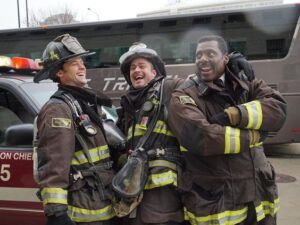
Introduction: Cruz’s Journey on Chicago Fire
Chicago Fire has consistently been one of the most captivating shows on television, drawing fans into the intense lives of firefighters and paramedics at Firehouse 51. Over the years, viewers have watched characters like Matthew Casey, Kelly Severide, and Joe Cruz navigate personal and professional challenges. Recently, one of the more intriguing developments involves Cruz’s decision to avoid taking the lieutenant test. While many fans have speculated about the reasons behind this choice, the show has given a clear answer that reveals much about Cruz’s character development and future on the team.
In this article, we’ll dive deep into why Joe Cruz, a beloved character in the Chicago Fire universe, will be skipping the lieutenant exam, exploring the narrative and emotional layers of his decision. We’ll also discuss how this move fits into his broader journey and what it means for his future within Firehouse 51.

The Background of Joe Cruz in Chicago Fire
Joe Cruz, portrayed by actor Joe Minoso, has been a central figure since the first season of Chicago Fire. Cruz is known for his hard-working, loyal, and empathetic personality, qualities that have made him a fan favorite over the years. His role as a firefighter has seen him face countless life-threatening situations, personal dilemmas, and the challenges of balancing a career in a high-risk field with his home life.
Throughout the series, Cruz has taken on leadership roles and demonstrated his readiness to take on more responsibility. However, despite his qualifications and capability, the idea of moving up the ranks to lieutenant has not always seemed to be Cruz’s top priority. With the announcement that Cruz will avoid taking the lieutenant test, fans have started to wonder: what does this decision reveal about him?
The Pressure of Leadership Roles in Chicago Fire
The Weight of Leadership
Being a lieutenant in the fire service is no small task. It’s a role that carries immense responsibility, not just for ensuring the safety of the crew but also for managing difficult situations and making life-or-death decisions. In Chicago Fire, we’ve seen how the pressure of leadership can affect various characters, including Lieutenant Casey and Lieutenant Severide. Both men have faced moments of doubt, personal struggles, and career challenges as they balanced their duty with their own mental health and emotional well-being.
For Cruz, the pressure of a leadership role may not be something he is willing to shoulder at this point in his career. Although he has the experience and skill to take on the role of a lieutenant, the psychological toll it might take on him could be a significant factor in his decision to avoid the test.
A Question of Priorities
Cruz’s decision might also be rooted in a shift in his priorities. Throughout the series, Cruz has faced personal challenges, including his emotional journey related to family, friendships, and his relationships. The pressures of taking on the lieutenant test may pale in comparison to the value he places on maintaining balance in his life.
For instance, Cruz has been deeply affected by events in his personal life, such as his father’s death and his brother’s struggles. These experiences have shaped Cruz into a character who values his emotional well-being and family life just as much as his career. The idea of moving into a more stressful leadership position might disrupt this balance and add undue strain.
Cruz’s Personal Reasons for Avoiding the Lieutenant Test
The Impact of Fatherhood
One of the most significant changes in Cruz’s life has been his transition into fatherhood. In earlier seasons, Cruz struggled with the notion of starting a family, but in recent seasons, he has embraced fatherhood and the responsibilities that come with it. Having a child has shifted his outlook on life, and he now seems to be prioritizing his family above everything else.
As a father, Cruz might feel that taking on the pressures of a lieutenant role would detract from his ability to be present for his family. Fatherhood requires time, attention, and emotional energy, and Cruz is probably aware that being a lieutenant could take him away from his family more frequently or require him to be more mentally exhausted when he’s home.
In interviews, actor Joe Minoso has hinted that Cruz’s role as a parent has dramatically changed his worldview. This might explain why he’s hesitant to put himself in a position where his work could jeopardize his family life, especially when balancing both roles could strain his ability to be the father he wants to be.
Emotional Stability and Stress
Another major reason for Cruz’s decision is his emotional well-being. Cruz has always been someone who wears his heart on his sleeve. He’s quick to support his fellow firefighters but also sensitive to the hardships they face. Throughout the series, we’ve seen him struggle with the weight of these emotional burdens, particularly during high-stress situations. The added stress of managing a team as a lieutenant could potentially take a toll on Cruz’s mental health, something that the writers of Chicago Fire have explored before.
It’s possible that Cruz has reflected on his own well-being and realized that continuing in his current role allows him to contribute meaningfully to Firehouse 51 without compromising his emotional stability. While being a lieutenant is a noble aspiration, Cruz might have concluded that the personal cost outweighs the professional benefit.
The Role of Mentorship and Team Dynamics
Cruz’s Leadership Style
Despite his reluctance to pursue a lieutenant position, Cruz is still a natural leader in many ways. He often steps up to the plate when his teammates need guidance or support, and his leadership is grounded in empathy, trust, and camaraderie. Cruz’s approach to leadership is less about authority and more about fostering a sense of unity and trust within the team.
In this regard, Cruz’s role as a mentor to younger firefighters like Jimmy Borrelli (and others) has been crucial. He’s demonstrated the ability to lead without the formal title of lieutenant, providing wisdom and guidance when needed. For Cruz, leadership might be about personal connections rather than positional power, and he could be more content in his current role, where he can mentor without the added responsibilities of formal promotion.
Team Cohesion and Firehouse Dynamics
Firehouse 51 thrives because of its sense of family and cohesion. Cruz’s decision to skip the lieutenant test could be a reflection of his desire to maintain the stability and camaraderie of the team. If he were to pursue the lieutenant exam, it could change the dynamic within the firehouse, especially with other potential candidates vying for the same position.
The team at Firehouse 51 is like a second family to Cruz, and his decision may come from a desire to maintain the current, close-knit atmosphere. In the past, Chicago Fire has shown how the promotion of one character can have ripple effects throughout the team, creating tension and challenges. Cruz may be conscious of this and may want to avoid any disruptions to the harmonious environment at the station.
What This Means for Cruz’s Future on Chicago Fire
A Shift in Career Path?
Cruz’s decision not to take the lieutenant test could signal a shift in his career trajectory. While it might initially seem like he’s stepping back, in reality, it could represent his decision to take a more balanced, fulfilling path within the firehouse. Instead of pursuing a rank that might bring stress and responsibility, Cruz might choose to focus on his work, relationships, and personal growth.
For the character, this decision could open up new opportunities for him to grow in other ways. Perhaps Cruz will find new challenges in his role that don’t involve formal promotion but still allow him to make a significant impact on the team and the community.
Continued Fan Favorite
One thing is certain: Cruz remains an integral part of Chicago Fire, regardless of his career trajectory. Fans of the show have always appreciated his relatability, humor, and loyalty. His decision to avoid the lieutenant test doesn’t make him any less valuable to the firehouse. If anything, it underscores his authenticity and his commitment to what truly matters to him—his family, friends, and his mental health.
Conclusion: Cruz’s Personal Choice and Growth
Cruz’s decision to avoid taking the lieutenant test on Chicago Fire is a complex one that reflects his personal growth and evolving priorities. While he has the skills, experience, and potential to excel in a higher-ranking role, his choice to stay in his current position is a testament to his desire for balance and emotional well-being. By focusing on what truly matters—his family, his health, and his relationships with his fellow firefighters—Cruz continues to show that leadership comes in many forms, and sometimes the best choice is to stay true to oneself.
This decision is sure to have a lasting impact on the character and will likely spark further emotional and narrative development in the seasons to come. Fans can only wait to see where Cruz’s journey will take him next, but one thing is clear: he’s always going to be an essential part of the Firehouse 51 family.
